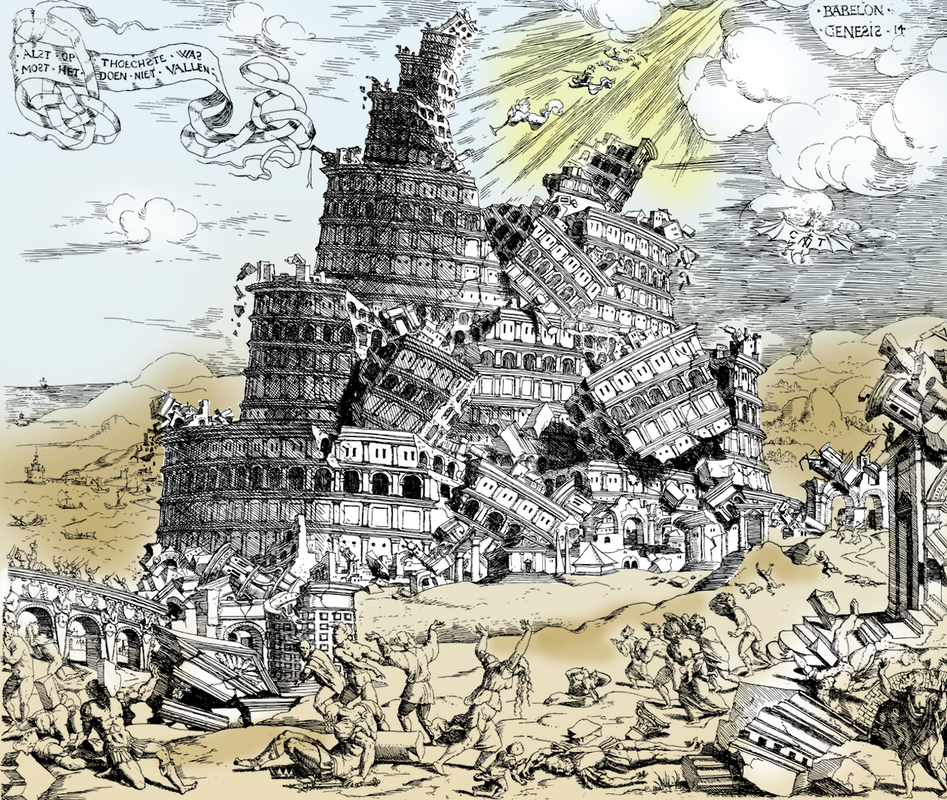|
Babel was a turning point in the Bible (Genesis 11:1-9). From there, Abraham came and changed the world. At Babel, God confused the languages of the people there, scattering them. Out of pride, they stopped glorifying God and sought to make a name for themselves (Genesis 11:4), and possibly make themselves equal to God (Genesis 3:4-5). But pride may not be the only reason for God’s intervention. Babel wasn’t just a tall building. Babel was also a city. Through language confusion, they stopped building the city (11:4,8). God called humans to fill the earth and multiple (Genesis 1:28; 9:1,7). But the people of Babel built the city so they wouldn’t be scattered over the face of the earth (11:4). They wanted to consolidate and strengthen their power. The city gave them a sense of security. We see similar events in Acts. Initially, the church in Jerusalem was warm and comfortable, with thousands converted. They were learning God’s words, fostering fellowship, eating together, sharing everything, and enjoying the favor of all the people. They could even communicate in different languages (Acts 2-4). But had they forgotten God telling them to spread the gospel to the ends of the earth? (Acts 1:8) Stephen’s speech in Acts 7 recounts Abraham leaving his homeland and changing the world; Joseph being exiled to Egypt, saving and growing the entire Israel tribe; the Israelites experiencing wonders in Egypt, like the splitting of Red Sea; and Moses receiving the laws at Mount Sinai and standing on a land God called holy ground. None of these events happened in Jerusalem. The focus shouldn’t be Jerusalem, their comfort zone; or their temple (God not dwelling in houses made by humans). After Stephen’s speech, great persecution scattered Christ’s followers throughout Judea and Samaria (Acts 8:1), Paul was transformed, and the gospel was widely spread (Acts 9). If we try to consolidate power and control our future with our ability, we will experience life like a little boat in a wild sea, violently tossed by huge and unpredictable waves. Don’t focus on your fragile security, name, influence, and power. Don’t focus on strengthening your power. Instead, forget ego and security. Trust that God controls everything and find peace in that. Offer yourselves to Him and be willing to be scattered to spread His glory. 巴别事件 巴别的出现是圣经的一个转折点(创世记 11:1-9)。 亚伯拉罕从那里而来,从此改变了世界。 上帝在巴别藉着变乱语言分散那里的人。他们出于骄傲,不再荣耀上帝,而是想为自己传扬名声(创世记11:4),或许期盼可以与上帝平等(创世记 3:4)。 但人的骄傲可能不是上帝干预的唯一原因. 巴别不仅仅是一栋高楼,也是一座城市。 那里的人因为语言混乱,停止建造这城 (创世记11:4,8)。 上帝呼召人遍满全地, 生养众多(创世记 1:28;9:1,7)。 但是巴别的人试图建造这城,使他们不会分散在地上(11:4)。 他们想巩固和加强自己的权力。 这城给了他们带来一种安全感。 我们在使徒行传中也看到类似的画面。 起初耶路撒冷的教会温暖而舒适,数以千计的人信主。 他们学习神的话,团契相交,一起吃饭, 凡物公用,得众人的喜爱。 他们甚至可以用不同的语言交流(使徒行传 2-4)。 但是,他们是否忘记了上帝托付他们要把福音传到地极的使命?(使徒行传 1:8) 司提反在使徒行传 7 章的演讲中复述了亚伯拉罕离开家园而改变世界; 约瑟被流放埃及而拯救并壮大整个以色列部落; 以色列人在埃及经历神迹奇事,例如红海分裂; 摩西在西奈山领受律法,站在上帝称为圣地的土地上。 这一切都没有发生在耶路撒冷。 注意力不应集中在他们的舒适区耶路撒冷或圣殿 (上帝并不住在人建造的房子里)。 司提反演讲后巨大的迫害使基督的追随者分散到整个犹大和撒马利亚(使徒行传 8:1),保罗信主生命被更新,福音被广传(使徒行传 9)。 如果我们试图用自己的能力去巩固权力,掌控自己的未来,就会经历到人生如同一艘小船,在茫茫大海中被狂风巨浪猛烈地抛掷撞击。 不要专注于自己脆弱的安全感、名誉感、影响力和权力。 不要专注于加强自己的力量. 相反地,忘记自我和安全感,相信上帝掌管一切,并在其中找到平安。 将自己献给祂,并愿意被祂差遣,四散全地传播祂的荣耀。
0 Comments
Sometimes we feel inadequate. Comparing ourselves to our neighbors can leave us feeling poor, unintelligent, fat, weak, old, or incapable. God has never called these things bad, but we do, and we work hard to cover them up. Behold the gigantic cosmetic industry.
We hide, puff ourselves up to make ourselves feel big, and put others down. Instead of accepting our mistakes, we blame others and God. Look at Adam and Eve. Initially, they were happy in the Garden of Eden, open to and accepted by God, each other, and themselves. Then they ignored what God told them and became their own judges. They were afraid and they hid (Genesis 3:8, 10). They also blamed others. Adam blamed Eve and God for putting Eve there (Genesis 3:12). Eve blamed the serpent and indirectly God for putting the serpent there (Genesis 3:13). Totally distracted, they missed their main mistake, which was disobeying God. How to get out? Assess ourselves soberly and accurately (Romans 12:3). Then, we will see we are broken. We have rebelled against God (Romans 3:23). But through Christ, God has accepted us as His children (Ephesians 1:5,7-8), destined to be holy and blameless (Ephesians 1:4). Nothing could separate us from His love (Romans 8:38-39). Not just loving us, God delights in us (Zephaniah3:17). With the almighty loving us so much, we shouldn’t be afraid and insecure (Romans8:31-32). Further, in Christ, we belong to a body (Romans12:4-5). As different parts of the body, we have our different strengths and weaknesses, serving different functions (Romans12:6-8). Our strengths are God’s gifts. There is no room for pride. Discover our strengths and use them diligently and effectively. Our weaknesses help us be more interdependent and humble. There is no room to feel inferior. Carefully identify our strengths and our weaknesses to find our role. In conclusion, know that we are broken. But through Christ, we are accepted as God’s beloved children. So, be strong and courageous. Identify our strengths and weaknesses to work as a team to love God and others. Summarized from Section Three of Chip Ingram’s book, True Spirituality: Becoming a Romans 12 Christian. 为什么我们没有安全感? 我们有时候与邻居相比见拙, 会觉得贫穷, 愚蠢, 肥胖, 虚弱, 苍老, 无力。上帝没有称这些事为不好的. 但我们会,还会试图掩盖它们的存在。看看庞大的化妆品行业。 隐藏真实的自己,自吹自擂,让自己感觉优越,贬低他人。不接受自己的错误,却责怪他人和上帝。 来看亚当和夏娃的故事。 他们最初在伊甸园中愉快地生活着,在上帝面前赤露敞开,坦然面对上帝,接受对方和自己. 后来他们却忽略了神曾吩咐过的事,成了自己的裁判。两人因为害怕而隐藏起来(创世纪3:8,10)。他们开始指责别人。亚当责备夏娃,也责怪上帝把夏娃放在伊甸园里(创世纪3:12)。夏娃则归咎于蛇,也就间接地怪神把蛇放在那里(创世纪3:13)。 这两人完全偏离了重点,忽视了最重要的错误,就是违背上帝的吩咐。 应该怎样脱离困境呢? 清醒而准确地评估自己(罗马书12:3),看到自我的破碎, 犯罪背叛了上帝(罗马书3:23)。 但是上帝通过基督,接纳我们作祂的儿女(以弗所书1:5,7-8),成为圣洁无瑕(以弗所书1:4)。没有任何事物可将我们与祂的爱分离(罗马书8:38-39)。上帝不仅爱我们,也喜欢我们(西番雅书3:17)。全能上帝神爱我们如此,我们为何还感觉害怕和不安(罗马书8:31-32)? 不仅如此,我们在基督里属于一体(罗马书12:4-5)。作为身体的不同部位,每人各有不同的优点和缺点,互相取长补短,行使不同的功用(罗马书12:6-8)。 优点是上帝的恩赐,没有自高自大的空间。应当发掘优点,勤勉而有效地利用它们。 弱点可帮助人更加懂得相互依赖和谦卑以待,没有自卑自怜的余地。 认真仔细地找出优点和弱点,从而找到相应的角色。 总而言之,当知道我们的破碎, 但通过基督被上帝接纳,成为上帝蒙爱的儿女,所以要勇敢坚强。找到我们的优点和缺点,取长补短,团结一致,一心一意地爱上帝,也爱他人,为他们服务。 A Tim Keller Sermon Summary Could we psych ourselves up against suffering by constantly telling ourselves to be happy? Psalms 126 shows us different paths.
Suffering is inevitable. The psalmist in Psalm 126 described Israelites as destitute, like the lifeless, barren desert of Negev. There was no mention of them doing anything wrong, yet they were in anguish. They might not have understood why they suffered, which can be a source of pain by itself. Christians may even weep more than others. Our hearts of stone have been changed to hearts of flesh, making us more vulnerable to feel pain than before (Ezekiel 11:19, 36:26). Even Christ, the perfect human, suffered. When we suffer, we must not give in to self-pity. Our suffering is nothing compared to what Christ went through for us. If we suffer in following Christ, then we should count it as a blessing (2 Corinthians 4:17). When we suffer, have faith that God is still with us. No matter what we’ve done, Christ has already endured our punishment. Be assured in God’s promise of His grace and eternal glory with us forever. Honestly express your feelings in prayer. One psalmist even asked God to go away so he could enjoy life again before dying (Psalms 39:13). God understands our frustration. When Christ was in deep sorrow in the Garden of Gethsemane (Matthew 26:36-46), and when God the Father abandoned Him on the cross (Matthew 47:46), Christ honestly expressed His pain. And be patient. Persistent prayer will end in praise. Many Psalms begin with the psalmists crying out to God but end in praise. Finally, be proactive. “Those who sow with tears will reap with songs of joy” (Psalms 126:5, 6). In summary, expect suffering. Don’t feel self-pity, but have faith that God is with us. So, honestly express your pain to Him in prayer. Be patient and proactive. God will provide, and He will deliver. Summarized from Tim Keller’s sermon: https://gospelinlife.com/downloads/praying-our-tears-5177/ 你能强迫自己快乐吗? 经常对自己说:“快乐!快乐!”就可以使自己不感到受苦吗?让诗篇126向我们展示不同的途径。 苦难不可避免。诗人在诗篇126中描述以色列人的贫困,就像内盖夫南地毫无生命的贫瘠沙漠。诗人没有提到以色列人做错了什么,也没有记载以色列人悔改的话,然而他们却流泪痛苦。他们可能不明白为什么受苦。这种不解的本身就是一个痛苦的根源。 基督徒甚至可能比其他人哭得更厉害。我们的石头之心已经变成柔软的肉心,比以前更容易感到痛苦(以西结书11:19;36:26)。 甚至基督一个完美的人也有悲哀的时候。 受苦时不要自怜。与基督为我们所经历的苦难相比,自己的痛苦微不足道。如果苦难是为了跟随基督,就该视受苦为祝福(哥林多后书4:17)! 受苦时要相信上帝对我们不离不弃。无论自己做了什么,基督已经为我们忍受惩罚。当肯定上帝的恩典和荣耀将永远与我们同在。 在祷告中诚实地表达自我的感受。一位诗篇的作者甚至要求上帝离开他,让他在死之前再次享受生活(诗篇39:13)。上帝理解我们的沮丧。基督在客西马尼园中极度悲伤时(马太福音26:36-46),或挂在十字架上父神离弃他时(马太福音47:46),也真诚地表达出他的悲痛。 要加忍耐。坚持不懈的祷告常会以赞美终结。很多诗篇的开端充满了悲楚,但以赞美神来结束。 此外,我们也要有主动的行动。“流淚撒種的,必欢呼收割”诗篇126:5,6。 总而言之,期待生命中有痛苦。在苦难中不应自怜,要信赖上帝与自己同在。在祷告中诚实地表达苦楚。耐心且主动点。上帝必会供应和拯救。 A Tim Keller Sermon Summary Fear and anxiety are compelling forces. The fear of losing can drive professional athletes to work very hard. But such emotions can also be debilitating. Sports can take over the life of professional athletes. One day, when their careers are over, they could be lost. Losing their identity and worrying about their future can drive them to self-destructive behavior.
The pressure of outside forces couple with our own self-doubt and guilt can paralyze us. In Psalm 3, David was fleeing from Absalom, his favorite son. David was outnumbered by enemies on all sides (v1, 6), and many feared that God had deserted him (v2). They questioned David’s authority to be their king, which threatened David’s foundation and identity. Let’s learn from David’s reactions. First, David trusted that God had not left him. God was a shield around him, answering David’s prayer from His holy mountain (v3-4). From God came deliverance (v8). Second, David’s glory is from God—not from his army, political power, moral standing or love of his people and his family, all of which he had lost. It was God who lifted his head high (v3). Similar verses in Genesis 15 show God assuring Abraham that He was Abraham’s shield and his very great reward (15:1). Despite their imperfections, both Abraham and David were protected in their faith in God’s love and mercy. Similarly, we can be God’s cherished children, and the almighty God can be our glory. Because of his trust in God, David did not suffer from fear, anxiety, or insomnia (v4-5). David’s head was lifted high (v3). After all, he was God’s anointed king. Third, David focused on God’s people. With the king fleeing, the country was likely in chaos. David asked God to strike his wicked enemies and to bless His people (v7-8). Likewise, we shouldn’t think only of ourselves, but think about others. In love, there is no fear (1 John 4:18). Thus, we must rely on Christ to fight fear and anxiety. He is our protection, and He is also our glory. And we shouldn’t just think about ourselves but focus on others as well. Summarized from a Tim Keller’s sermon titled, “How to Fight Fear and Anxiety" https://gospelinlife.com/downloads/praying-our-fears-5178/ 如何对抗恐惧和焦虑? 恐惧和焦虑可能是很好的推动力。例如恐惧失败促使专业运动员加倍努力。但这种情绪也可以摧残人。对于专业运动员来说竞技运动就是生命。有一天职业生涯结束时,就对人生可能会迷失方向。失去自我和对未来的优虑可促使他们完全失落。 人对无法控制的外来力量会觉得难以承受,自我怀疑和内疚像雪上加霜可导致精神崩溃。 诗篇第3篇中谈论大卫被最喜欢的儿子押沙龙追杀。各方敌人的数量完全超过了大卫的人(诗篇3:1,6)。许多人指出上帝已经离弃他(诗篇3:2)。有人质疑大卫做国王的权威,威胁到大卫的根基和身份。 让我们从大卫的身上学习。 首先,大卫相信上帝没有离开他。神是他的盾牌,并四围保护着他。上帝从自己的圣山垂听大卫的祷告(诗篇3:3-4-4) 拯救大卫(诗篇3:8)。 其次,大卫的荣耀是来自上帝,不是自己的军队、政治权力、道德地位或人民和家人的爱,此刻的大卫已经完全失去了这一切。上帝是使他抬起头来的那一位(诗篇3:3)。 创世纪15章中也有类似的经文。在那里,上帝告诉亚伯拉罕上帝是他的盾牌和赏赐(创世纪15:1)。尽管他们不完美,亚伯拉罕和大卫都在相信上帝的慈爱和怜悯中得到保护。 我们同样地可以成为上帝珍爱的儿女,全能的上帝可以成为我们的荣耀。大卫基于对上帝的信任,没有恐惧,焦虑和失眠(诗篇3:4-5)。大卫的头抬高了(诗篇3:3)。毕竟他是被上帝受膏的王。 第三,大卫也关注上帝的子民。可以想像大卫逃亡时的以色列何等混乱。大卫祈求上帝打击他的邪恶敌人,也恳求上帝祝福祂的子民(诗篇3:7-8)。 不要自己为中心,只想到自己。想想别人吧!在爱中没有恐惧(约翰壹书4:18)。 因此,当倚靠基督来对抗恐惧和焦虑。基督是我们的保护,亦是我们的荣耀。不要只想到自己,也要关注他人。 A Tim Keller Sermon Summary Troubles in life cause anxiety and stress. Breathing exercises, meditation, and work/life balance are some techniques to deal with stress, but Philippians 4:4-12 focuses on the fundamentals.
Inner calm and contentment come from God’s peace, which transcends all understanding (v6-7). Regularly facing attack, torture, and death, Paul teaches us that such contentment can be learned (v11-12). First, think about whatever is true, noble, and right. Think about whatever is pure, lovely, and admirable (v8). Think about God sending His Son to redeem us, to bring us back to Him. Christ on the cross died a violent death, sacrificing His peace, so we could have eternal peace (2 Corinthians 5:21). Think about God’s love. Second, thank God as you present Him your requests (v6). God may not grant our requests, but He will provide. No matter how bad we have been, we know God has accepted us through Christ’s death on the cross. How would He not always give us the best, when He even gave us His only Son? Trust that He cares. Third, set your heart and build your house on God. When we build our foundation on sand, our lives become restless, filled with anxiety and devoid of peace. In all things, God works for the good of those who love Him (Romans 8:28). Focus on loving and serving our unchanging God. Then we will find peace. In 1870s, Horatio Spafford went bankrupt just before his five children, one son and four daughters, died. In the wake of such tragedy, he wrote, “It is well with my soul”: Peace, like a river, attendeth my way . . . My sin . . . is nailed to the cross, and I bear it no more . . . praise the Lord, O my soul . . . It is well with my soul. Think about God’s love and what He has done for us. Present your requests to Him and thank Him. And set your heart on our unchanging God. Then you will find peace. Summarized from a Tim Keller’s sermon, titled, “Peace comes from focusing on God” https://gospelinlife.com/downloads/peace-8602/ 疯狂世界中的平安 生活中的烦恼导致焦虑和压力。呼吸运动、静坐冥想和平衡工作与生活是一些应对压力的不同方法,而腓立比书4:4-12特别关注应对压力的基本原则。 上帝出人意料的平安带来内心的平静和满足(腓比书4:6-7)。保罗经常面对攻击、折磨和死亡的挑战。他教导我们如何学来这样属天的满足(腓立比书4:11-12)。 首先,要思念任何真实的,可敬的和公义的;思念任何清洁的,可爱的和有美名的(腓立比书4:8)。思念上帝差派祂的儿子救赎了我们。基督在十字架上残酷地死亡,祂失去平安,使我们可以拥有平安(哥林多后书5:21)。思念神的爱。 其次,向上帝提出自己的要求,然后感谢祂(腓立比书4:6)。上帝可能不答应祈祷的要求,但上帝会供应的。无论光景如何糟糕,通过基督在十字架上的死,我们知道上帝接纳了自己。当祂赐下了唯一的儿子时,又怎么可能不赐给最好的呢?相信祂的关心。 第三,将内心像房屋一样建立在神上。如果内心建立在其它任何事物上,其基础都会像房屋建立在沙滩上,令生活变得焦躁不安,充满焦虑,没有平安. 上帝让所有的事情都相互效力为让爱祂的人得益处(罗马书8:28)。专心于爱和服事那不变的上帝,祂的平安就将与我们同在。 19世纪70年代,Horatio Spafford 破产了,随即他的儿子和四个女儿相继去世。在如此悲痛浩劫中,他写道:我有平安如江河 我有平安如江河在我心。平安如江河....我的罪...钉在十字架上,我不再需要依靠自己去承受....我的灵魂啊,赞美主啊....我灵魂安好无恙。 回想上帝为我们做了些什么. 思念祂的爱。向祂提出自己的祈求并感谢祂。将我们的内心安置于不变的神上。如此,和平就会从祂而来。 A Tim Keller Sermon Summary Imagine you are sick, you need money to pay rent, and suddenly you’re fired. Or, in a yacht in the Pacific, you are hit by a huge storm with 40-foot waves. Can you still be at peace?
In Psalm 3, David’s enemies greatly outnumbered his. They assailed him on every side. Yet David could rest and sleep without fear. How do we manage this? We often feel anxious when we desperately work towards certain goals without achieving them. We try hard to defend and prove ourselves but often fall short. Our environment also causes anxiety. In “The Trial,” Frank Kafka describes a man accused of a crime that can not be defined. Initially, assuming the world a rational place and he a decent person, he thought he would be released. But he was executed. The world is not rational. In the words of Sigmund Freud, “Most people are trash.” How can we find peace? First, we must accept that we are in a very bad shape. We constantly fail in following the two biggest commandments: loving God with all of our hearts and loving others as ourselves. We often fall short of the same metrics we judge others with (Romans 2:14). We must accept our failures. By our effort, we could never be accepted by God (Hebrews 4:10). Don’t seek rest in your accomplishments, relationships, wealth, or abilities. All these things could change overnight. How can we rest on something that constantly changes? How can you sleep on a bed that keeps moving? Instead, rely on Christ. Rely on what He has done for us (Hebrews 4:10). David could rest because he depended on God. He didn’t find his glory in his power or wealth, but in God alone (Psalms 3:3). To conclude, if we want to be at peace and still strive even in very difficult situations, we must depend on Christ and let God be our glory. Summarized from a Tim Keller’s sermon, titled, “How to be at peace, yet strive”: https://gospelinlife.com/downloads/entering-his-rest-4th-5057/ 如何在动荡中心怀平安? 想象你卧病在床,但租金很快就要到期, 而突然你被解雇。又或者你在太平洋的游艇上遇到暴风巨浪的冲击。你还能心怀平安吗? 在诗篇第3篇中,大卫的敌人从四面八方攻击,数量也大大地占上风。即使如此,大卫还能放松休息,躺下睡觉而毫不害怕。 如何能够心怀平安而又努力奋斗呢? 人在通常情况下如果屡次达不到某些重要的目标时,就会感到焦虑。又或者不论如何努力辩护和证明自己,但怎么样都做不到。我们也会烦躁焦急。 环境也可使人感到焦虑。小说“TheTrial”的作者Frank Kafka描述了一名被含糊不清的罪而被指控的疑犯Josef。最初,他认为世界是有理性的,再者自己也不是坏人,因此会被释放而获得自由的。但最后他被处决了。世界并非到处都有理性的,就像有名的心理学家Sigmund Freud所说:“大多数人都是垃圾。” 怎样才能得享平安? 为了拥有上帝的平安,首先要接受自己很糟糕的现状。 我们不仅没有遵守两条最大的诫命(尽心尽意地爱上帝以及爱人如己),还基于自定的规则判断他人,但可笑的是自己却无法遵守这些规则(罗马书2:14)。 自我的努力永远不能赚得上帝的接纳。承认我们的失败吧(希伯来书4:10)。 不要依赖自己的成就、关系、财富或能力。所有这些都可在一夜之间改变。如何能倚靠和安息于不断变化的事物?如果床不停地移动,人又怎能安然入睡? 相反地,倚靠基督以及祂为我们所做过的事(希伯来书4:10)。 大卫可以休息,因为他依赖上帝。他只是在上帝身上而没有在权力或财富中找到荣耀(诗篇3:3)。 总而言之,无论在什么困境中, 如果想要平安,此外仍然向目标努力前进,我们应当依靠基督及让上帝成为我们的荣耀。 |
Categories
All
|
Proudly powered by Weebly





